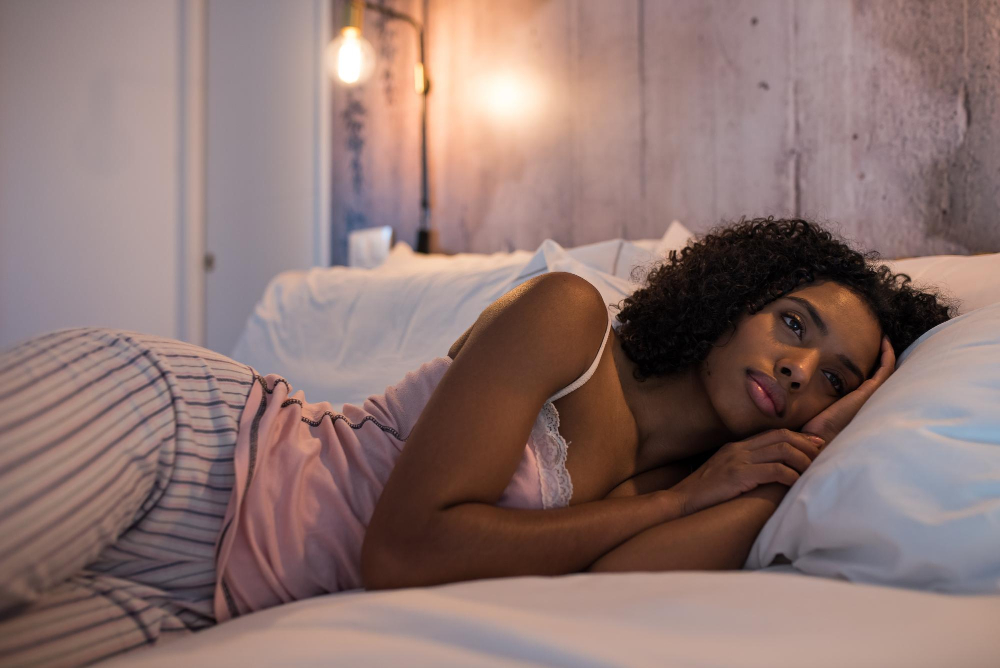🎧 Listen to: Insomnia

Insomnia
What is insomnia?
Have you ever tossed and turned all night, staring at the ceiling, unable to sleep? Or woken up feeling more tired than before you went to bed? If this happens often, you may have insomnia a condition where a person finds it hard to fall asleep, stay asleep, or wake up feeling refreshed.
Many Africans suffer from sleep problems, but they don’t always take them seriously. Some blame it on stress, work, or even “bad luck.” However, insomnia is a real health issue that can affect your body and mind.
How common is insomnia in Africa?
Research shows that sleep problems are rising across Africa. According to the world health organization (WHO), 1 in 3 adults globally experience insomnia, and the numbers in Africa are increasing due to urbanization, work stress, and lifestyle changes. In countries like Nigeria, Ghana, and South Africa, many people work long hours, use mobile phones late at night, or struggle with financial worries—all of which can cause insomnia.
How do you know you have insomnia?
If you have insomnia, you might:
- Struggle to fall asleep at night
- Wake up several times during the night
- Wake up too early and find it hard to go back to sleep
- Feel extremely tired during the day
- Have trouble focusing at work or school
Types of insomnia:
- Short-term (acute) insomnia: Lasts for a few days or weeks
- Long-term (chronic) insomnia: Lasts for a month or more
- Comorbid insomnia: Happens along with other health conditions
- Onset insomnia: Trouble falling asleep
- Maintenance insomnia: Difficulty staying asleep Effects of insomnia: How it affects your health?
Many Africans believe lack of sleep is “normal” because of hard work or stress, but longterm insomnia can cause serious health problems, including:
- Physical health risks:
- High blood pressure and heart disease
- Diabetes and obesity
- Stroke
- Weakened immune system (making you prone to infections)
- Chronic pain and headaches
- Mental health risks:
- Depression and anxiety
- Irritability and mood swings
- Poor memory and difficulty thinking clearly
- Increased risk of accidents (e.g., road accidents due to drowsy driving)
Studies show that people who sleep less than 6 hours a night have a 12% higher risk of early death compared to those who sleep 7–8 hours.
What causes insomnia?
Sometimes insomnia has no clear cause (primary insomnia), but in many cases, it happens because of other factors (secondary insomnia), such as:
- Stress: Financial problems, work pressure, or family issues
- Health conditions: Asthma, diabetes, heart disease, chronic pain, or pregnancy discomfort
- Mental health issues: Depression, anxiety, or trauma
- Medications: Some painkillers, antidepressants, and high blood pressure drugs
- Lifestyle factors: Drinking too much caffeine, using your phone late at night, or working night shifts
Lifestyle habits that increase your risk for insomnia?
Many daily habits can make it harder to sleep, including:
- Irregular sleep schedule: Sleeping and waking up at different times
- Too much screen time: Using phones, laptops, or TVs before bed
- Lack of physical activity: Little or no exercise during the day
- Eating late at night: Heavy meals close to bedtime
- Too much noise or light in your bedroom
- Excessive caffeine, alcohol, or smoking
- Recent emotional events: Such as the loss of a loved one or financial stress
How can you manage insomnia?
Instead of relying on sleeping pills, try these natural ways to improve sleep:
Lifestyle changes:
- Sleep and wake up at the same time every day
- Avoid caffeine (coffee, tea, energy drinks) and alcohol at night
- Reduce screen time an hour before bed
- Exercise regularly but not too close to bedtime
- Create a calm sleep environment—use dim lights, reduce noise, and get a comfortable mattress
- Do not take long naps during the day
Cognitive behavioral therapy (CBT) for insomnia
Experts recommend CBT-I (cognitive behavioral therapy for insomnia) as a first-line treatment. This therapy helps retrain your mind and body to sleep better. It includes:
- Stimulus control: Getting out of bed if you can’t sleep and doing something relaxing until you feel sleepy
- Sleep restriction: Training your body to sleep only when necessary to improve sleep quality
- Bright light therapy: Using light exposure to adjust your sleep patterns
Medications and supplements
Doctors may prescribe sleeping pills like:
- Eszopiclone (lunesta)
- Zolpidem (ambien)
- Triazolam (halcion)
There are also natural supplements, such as melatonin, which helps regulate sleep. However, it is best to try lifestyle changes first before using medication.
